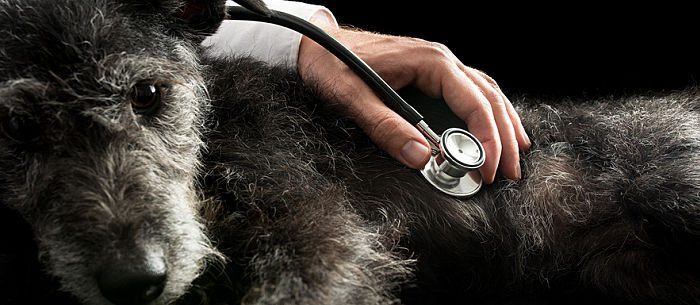Your dog has been diagnosed with a heart murmur. Add that to your list of pet owner worries. But try not to worry. Heart murmurs are easily identified and treated if found early. Let’s start with the basics.
What is a Dog Heart Murmur?
A heart murmur has to do with the sound that a vet hears while listening to a dog’s heartbeat. “Normally, the contraction and relaxation of heart muscles create an audible ‘lub’ and ‘dub’ sound with every heartbeat. A murmur interferes with these two sounds and is commonly heard as a ‘swish’ or ‘whoosh’ in between or after the ‘lub’ or ‘dub,’ says veterinarian Dr. Patrick Mahaney of California Pet Wellness and Acupuncture. If your vet picks up a “whooshing” sound while listening with a stethoscope, she may want to find out what’s going on.
“Heart murmurs can be caused by abnormal blood flow within the heart, usually involving the heart valves. Murmurs can also be caused by problems in communication between the left and right sides of the heart,” says veterinarian and writer Dr. Karen Becker of Healthy Pets. “Murmurs can be congenital or they can be caused by disease or the aging process.” You may notice that your dog tires easily, gets out of breath quicker than he used to, coughs frequently or is generally lethargic. If so, those may be a sign that something is up, and a trip to the vet may be in order.
6 Grades of Dog Heart Murmurs
If your vet notices that your dog has a heart murmur, she will classify it into one of six grades.
“There are many types of heart murmurs, so a grading scale (I through VI) has been established to give a numerical score based on the severity of the murmur,” says Dr. Mahaney:
- Grade I
A murmur that can barely be heard with a stethoscope is labeled Grade I.
- Grade II
A soft (quiet) murmur that can easily be heard with a stethoscope is Grade II.
- Grade III
A murmur of intermediate volume is Grade III. Murmurs that significantly affect how blood flows through the heart are typically Grade III or higher.
- Grade IV
This is a loud murmur originating in one part of the heart that can be heard in another — for example, a left-sided heart murmur that radiates to and can be heard on the right side.
- Grade V
This is a very loud murmur that can be heard with a stethoscope that is barely contacting the chest wall. Additionally, a vibration is created that can be felt with one’s fingers.
- Grade VI
A worse (stronger, louder) version of grade V.
If your vet determines that your dog’s murmur is Grade III or higher, then your dog will need further diagnostic evaluation, says Dr. Mahaney. You will probably have to schedule an appointment with a board certified veterinary cardiologist. Diagnostic tests include an electrocardiogram (ECG) — which is also known as an elektrokardiogram (EKG) — radiographs (X-rays) of the chest, blood pressure evaluation, blood and urine testing, and others.
Prevention and Treatment
Since most heart murmurs are found at birth, there isn’t much you can do about these types of murmurs. However, some murmurs can develop over time if your pet is exposed to parasites or has valve deterioration of the heart. To prevent these or other heart problems in your dog, make sure you keep him at an ideal body weight and go for regular vet check-ups. If your dog is prescribed a medicine for his heart, make sure you administer it as directed and continue until directed to stop.
How your dog’s heart murmur gets treated depends on her diagnosis, says Dr. Mahaney. Your vet might prescribe medications that reduce the pressure against which the heart has to pump, alter electrolyte function in cardiac cells or have other mechanisms of action. Your dog might need surgery to resolve certain types of murmurs, especially those involving defects in heart walls that permit blood to improperly flow from one side to the other.
Moving Forward
Always make sure that anyone watching over your dog, such as a dog walker or sitter, knows your dog’s health history, especially when dealing with a dog heart murmur. Your pet caregiver will need to know how to administer any current medicines and will need to know of any restrictions on your dog’s activity level and food intake. You should also be sure that your pet sitter knows how to reach your vet if you are unavailable.
For more on dog health, check out these 10 Must-Dos When You Have a Diabetic Dog.
Christina Montoya Fiedler is a Los Angeles-based parenting writer and mom to two human boys and one furry puppy boy.
* This article is for general informational purposes only. It is not intended nor implied to be providing medical advice and is not a substitute for such advice. The reader should always consult a health care provider concerning any medical condition or treatment plan. Neither Care.com nor the author assumes any responsibility or liability with respect to use of any information contained herein.



